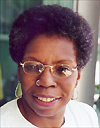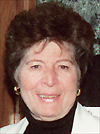|
By Jenny Coyle and John Byrne Barry
Rhonda Anderson - Detroit, Mich.
Environmental Justice Organizer
 Rhonda Anderson came of age in Detroit during the '60s and remembers it all like yesterday: the assassinations, the Black Panthers, Vietnam, riots, tanks rolling through her neighborhood. Rhonda Anderson came of age in Detroit during the '60s and remembers it all like yesterday: the assassinations, the Black Panthers, Vietnam, riots, tanks rolling through her neighborhood.
"The day Martin Luther King was killed, I saw this huge black cloud coming down the street. It was kids from one high school coming to gather the students at our school to join them in a march through the streets. The first person in the crowd was a girl. She had her fist raised and was yelling, 'Black Power! Black Power!' I will never forget that."
Since then, Anderson has worked for equal rights for blacks and women; delivered food, condoms and hygiene kits to prostitutes in her city; helped homeless girls find jobs or return to school. She was part of the effort to shut down a polluting incinerator, and then worked in a juvenile detention center where most of the inmates are black. It occurred to her that many Detroit youth show the effects of growing up in a toxic environment - a sad fact she's working to change by, for instance, getting industrial sites cleaned up.
"To me, being black has been a war," Anderson says. "I've always fought, always struggled against a power that appears bigger than I am. But I know I'm making a difference by organizing my community. People tell me so."
Michael Gregory - McNeal, Ariz.
Member, Conservation Governance Committee
 In the early '70s, Michael Gregory was a U.S. Forest Service employee keeping an eye on forest fires from lookout towers and sometimes fighting them on the front line. That's when he discovered that the agency was spraying the herbicide 2,4,5-T - now banned - on the national forests around him. In the early '70s, Michael Gregory was a U.S. Forest Service employee keeping an eye on forest fires from lookout towers and sometimes fighting them on the front line. That's when he discovered that the agency was spraying the herbicide 2,4,5-T - now banned - on the national forests around him.
"I knew it was an ingredient in Agent Orange, recently banned in Vietnam, and birth defects from its use were being reported by people near national forests in Oregon, Minnesota and elsewhere," says Gregory. "So I started researching and writing about it."
Some of his articles appeared in the Grand Canyon Chapter newsletter, and not long after that, the chapter and the Wilderness Society asked him to help pass a wilderness bill in Arizona. He agreed to help - if the Club would make him the pesticides chair of the chapter. They did, and Gregory helped organize a national anti-herbicide movement.
In 1990 he launched a new organization called Arizona Toxics Information, focusing on right-to-know laws, pollution prevention and public participation. Since then he's worked on U.S.- Mexico border issues, and is the Club's point-person on the recently signed Stockholm Convention on Persistent Organic Pesticides (POPs).
Worldly? Yes. But Gregory also cares deeply about his own backyard: a 40-acre off-the-grid homestead with apple, peach, pear and plum trees and a big garden.
Organic, of course.
Anne Wheeler - Palm City, Fla.
Member, National Advisory Council
 When other girls were reading "Little House on the Prairie," Anne Wheeler was into "The Call of the Wild." An only child and a self-described "hillbilly from Missouri," she told her doting parents, "I will go to Alaska as soon as you let me." When other girls were reading "Little House on the Prairie," Anne Wheeler was into "The Call of the Wild." An only child and a self-described "hillbilly from Missouri," she told her doting parents, "I will go to Alaska as soon as you let me."
In 1949, back when "girls didn't do these kinds of things," she ventured north to attend Alaska's only university. Later she became secretary to the president of the university, flying all over the vast territory on university business with him in his Super Piper Cub. It was then that she visited what we know today as the Arctic National Wildlife Refuge, on the still unspoiled Arctic Coast.
"Once you land and the creaking of the plane stops," she says, "you can see forever and it's still and stark and there's a quality of sacredness."
After five years, she returned "outside" - that's what Alaskans call anywhere else - to resume graduate studies and pursue her profession for 40 years as a teacher of teachers and children.
Retired now, and a member of the Club's National Advisory Committee, she had an opportunity this past spring to go to Washington to lobby on behalf of protecting the Arctic Refuge. "It was heady stuff," she said of her meeting with her senator, Bill Nelson, "To think that my voice might have an impact is very exciting."
Know someone whose story is deserving? Contact us at The Planet, 85 Second St., Second Floor, San Francisco, CA 94105; planet@sierraclub.org.
Up to Top
|